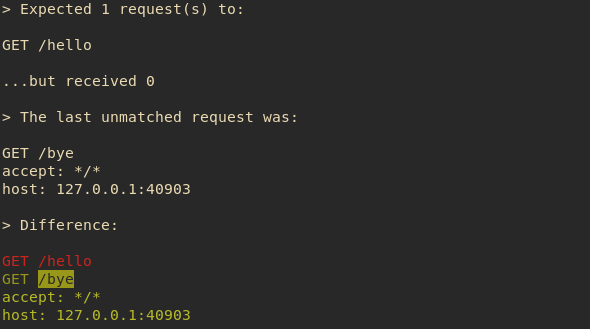https://github.com/lipanski/mockito
HTTP mocking for Rust!
https://github.com/lipanski/mockito
http http-mock http-mocking httpmock mock mocks rust test test-framework webmock
Last synced: 9 months ago
JSON representation
HTTP mocking for Rust!
- Host: GitHub
- URL: https://github.com/lipanski/mockito
- Owner: lipanski
- License: mit
- Created: 2016-01-10T22:18:04.000Z (about 10 years ago)
- Default Branch: master
- Last Pushed: 2025-03-04T09:29:20.000Z (12 months ago)
- Last Synced: 2025-04-28T10:54:58.161Z (10 months ago)
- Topics: http, http-mock, http-mocking, httpmock, mock, mocks, rust, test, test-framework, webmock
- Language: Rust
- Homepage:
- Size: 1.47 MB
- Stars: 731
- Watchers: 3
- Forks: 60
- Open Issues: 7
-
Metadata Files:
- Readme: README.md
- Funding: .github/FUNDING.yml
- License: LICENSE
Awesome Lists containing this project
- awesome-rust-with-stars - mockito - 01-21 | (Development tools / Testing)
README

HTTP mocking for Rust!
Mockito is a library for **generating and delivering HTTP mocks** in Rust. You can use it for integration testing
or offline work. Mockito runs a local pool of HTTP servers which create, deliver and remove the mocks.
## Features
- Supports HTTP1/2
- Runs your tests in parallel
- Comes with a wide range of request matchers (Regex, JSON, query parameters etc.)
- Checks that a mock was called (spy)
- Mocks multiple hosts at the same time
- Exposes sync and async interfaces
- Prints out a colored diff of the last unmatched request in case of errors
- Simple, intuitive API
- An awesome logo
The full documentation is available at .
Before upgrading, make sure to check out the [changelog](https://github.com/lipanski/mockito/releases).
## Getting Started
Add `mockito` to your `Cargo.toml` and start mocking:
```rust
#[test]
fn test_something() {
// Request a new server from the pool
let mut server = mockito::Server::new();
// Use one of these addresses to configure your client
let host = server.host_with_port();
let url = server.url();
// Create a mock
let mock = server.mock("GET", "/hello")
.with_status(201)
.with_header("content-type", "text/plain")
.with_header("x-api-key", "1234")
.with_body("world")
.create();
// Any calls to GET /hello beyond this line will respond with 201, the
// `content-type: text/plain` header and the body "world".
// You can use `Mock::assert` to verify that your mock was called
mock.assert();
}
```
If `Mock::assert` fails, a colored diff of the last unmatched request is displayed:

Use **matchers** to handle requests to the same endpoint in a different way:
```rust
#[test]
fn test_something() {
let mut server = mockito::Server::new();
server.mock("GET", "/greetings")
.match_header("content-type", "application/json")
.match_body(mockito::Matcher::PartialJsonString(
"{\"greeting\": \"hello\"}".to_string(),
))
.with_body("hello json")
.create();
server.mock("GET", "/greetings")
.match_header("content-type", "application/text")
.match_body(mockito::Matcher::Regex("greeting=hello".to_string()))
.with_body("hello text")
.create();
}
```
Start **multiple servers** to simulate requests to different hosts:
```rust
#[test]
fn test_something() {
let mut twitter = mockito::Server::new();
let mut github = mockito::Server::new();
// These mocks will be available at `twitter.url()`
let twitter_mock = twitter.mock("GET", "/api").create();
// These mocks will be available at `github.url()`
let github_mock = github.mock("GET", "/api").create();
}
```
Write **async** tests (make sure to use the `_async` methods!):
```rust
#[tokio::test]
async fn test_simple_route_mock_async() {
let mut server = Server::new_async().await;
let m1 = server.mock("GET", "/a").with_body("aaa").create_async().await;
let m2 = server.mock("GET", "/b").with_body("bbb").create_async().await;
let (m1, m2) = futures::join!(m1, m2);
// You can use `Mock::assert_async` to verify that your mock was called
// m1.assert_async().await;
// m2.assert_async().await;
}
```
Start a **stand-alone server** on a dedicated port:
```rust
fn main() {
let opts = mockito::ServerOpts {
host: "0.0.0.0",
port: 1234,
..Default::default()
};
let mut server = mockito::Server::new_with_opts(opts);
let _m = server.mock("GET", "/").with_body("hello world").create();
loop {}
}
```
## Minimum supported Rust toolchain
The current minimum support Rust toolchain is **1.70.0**
## Contribution Guidelines
1. Check the existing issues and pull requests.
2. One commit is one feature - consider squashing.
3. Format code with `cargo fmt`.
4. :shipit:
## Development
### Tests
Run tests:
```sh
cargo test
```
...or run tests using a different toolchain:
```sh
rustup run --install 1.70.0 cargo test
```
...or run tests while disabling the default features (e.g. the colors):
```sh
cargo test --no-default-features
```
### Code style
Mockito uses [rustfmt](https://github.com/rust-lang/rustfmt) as a general code style.
Install `rustfmt`:
```sh
rustup component add rustfmt
```
Format code:
```sh
cargo fmt
```
Some editors might provide a plugin to format your Rust code automatically.
### Linter
Mockito uses [clippy](https://github.com/rust-lang/rust-clippy) and it should be run always on the minimum supported Rust version, in order to ensure backwards compatibility.
Install `clippy`:
```sh
rustup component add clippy
```
The linter is always run on the minimum supported Rust version:
```sh
rustup run --install 1.70.0 cargo clippy-mockito
```
### Release
Release:
```sh
cargo publish
```
### Benchmarks
Install `rust nightly`:
```sh
rustup install nightly
```
Run benchmarks:
```sh
rustup run nightly cargo bench
```


